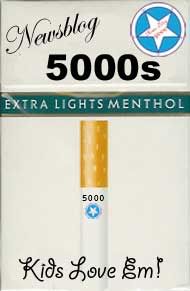Dixie Chicks Continue to Hate Freedom
Monday, April 17, 2006
(SNN Odessa) The Austin trio that announced that they wanted to see the bodies of American soldiers strewn across the loveless desert is at it again.

Not only have the Dixie Chicks refused to apologize for refusing to support the president and the global war on terror, their first single "Not Ready to Make Nice" seems specifically chosen to be inflammatory and divisive.
Many people even go as far as to say that the new single is divisive on purpose. They say that the Dixie Chicks do not want the same people who attacked their patriotism and intelligence, threatened their lives, and encouraged their children to spit at them to buy their album.
This is the final insult. Not only are the Dixie Chicks un-American enough to not support the president, they have the anti-American view that they don't have to take the money of someone who terrorized them.
"Not Ready to Make Nice" joins the Nine Inch Nails song "With Teeth" and the entire Green Day American Idiot album as songs that will not be played by a large number of country and western radio stations.
Is this an opportunity for people who have voices to speak out and ask questions? Yes! Is it right to not be proud of our President? Yes, people are entitled to their opinions. Is it right to publicly say " I am not proud of our President"? It hurts to feel it, and it hurts to say it but yes it is right.
I AM AN AMERICAN AND PROUD TO BE LIVING IN A COUNTRY WHERE I CAN SAY WHAT I FEEL/BELIEVE.
I AM SAD THAT THE COUNTRY IS NOT SAFE. I AM SAD PEOPLE WITH THEIR OWN DREAMS ARE DYING FOR OUR PROTECTION, IN ORDER FOR US TO ACHIEVE OURS. I AM TERRIFIED WHERE THIS COUNTRY WILL BE IN 10 YEARS.
From this moment on, I will stand for what I believe and not back down from what my heart tells me. I will get involved with political parties that do the same. I will vote and spread my own word. I will get involved in my community and help out as much as possible. I will not sit for another 7 MINUTES without acting upon improving my own life, someone else's life, or helping our country where my loved ones live, where I live.
With TAKING THE LONG WAY, one of the most anticipated albums in recent years, the Dixie Chicks are putting themselves out there like never before. For the first time, every one of the disc's fourteen songs are co-written by the Chicks themselves, exploring themes both deeply private and resoundingly political. Collaborating with legendary producer Rick Rubin (who has worked with everyone from Johnny Cash to the Red Hot Chili Peppers, from Run DMC to Neil Diamond), the biggest-selling female band in history has truly pushed themselves to new heights both as writers and as performers.
"Everything felt more personal this time," says Natalie Maines. "I go back to songs we've done in the past and there's just more maturity, depth, intelligence on these. They just feel more grown-up."
Rubin assembled a band including Chili Peppers drummer Chad Smith, session hero Larry Knechtel, and Heartbreakers Benmont Tench and Mike Campbell, and matched the Chicks with co-writers including Dan Wilson (who wound up collaborating on six of TAKING THE LONG WAY's songs), Pete Yorn, and Gary Louris of the Jayhawks.
Inspired by such classic rock artists as the Eagles, Tom Petty and the Heartbreakers, and the Mamas and the Papas, TAKING THE LONG WAY adds a sweeping, Southern California vibe to the Chicks' down-home intimacy. That ambition is matched with lyrics addressing everything from small-town narrow-mindedness ("Lubbock or Leave It") to the psychology of celebrity ("Everybody Knows").
Not just "big for a country band" or "big for a big female band," the Dixie Chicks are a multi-platinum selling act in North America, Europe and Australia as well as one of a mere handful of acts with multiple albums achieving "diamond" status (meaning sales over 10 million copies) - both WIDE OPEN SPACES (1998) and FLY (1999) hit that stratospheric landmark - and have won nine Grammy awards. Their on-stage reputation has helped them sell over $100 million worth of concert tickets, and outspoken songs like "Goodbye, Earl" made it clear that this power trio played by nobody's rules.
And that was all before Natalie Maines's comments about a fellow Texan, President George W. Bush, during a London appearance in March, 2003 really put the Dixie Chicks in the headlines. The resultant uproar - complete with boycotts and death threats - is the focus of TAKING THE LONG WAY's defiant first track, "Not Ready to Make Nice." "The stakes were definitely higher on that song," says Robison. "We knew it was special because it was so autobiographical, and we had to get it right. And once we had that song done, it freed us up to do the rest of the album without that burden."
The results cover an impressive range of territory. "Silent House" examines the emotions that come from watching an older relative struggle with Alzheimer's. "It's So Hard When It Doesn't Come Easy" addresses infertility, an issue that both Robison and Maguire have faced. The Chicks debuted the gospel-inflected "I Hope," co-written with Keb' Mo, during last year's telethon benefiting the victims of Hurricane Katrina; the album version features a blistering guitar solo by John Mayer.
"This album was total therapy," says Natalie Maines. "I'm way more at peace now. Writing these songs and saying everything we had to say makes it possible to move on."
Details are forthcoming on a worldwide Dixie Chicks concert tour that will kick-off this summer.
TAKING THE LONG WAY
TRACK BY TRACK
1. The Long Way Around
Emily: That's a journey song, about the different stages in our lives. A recap of where we've been, where we're going - and it was nice to remind ourselves of all that.
Natalie: We've always written songs that are about other people. It's so much harder to put yourself out there and be honest with your emotions and your beliefs, but the songs are so much better and mean so much more when you can let yourself be vulnerable.
2. Easy Silence
Martie: We didn't set out to write a lot of love songs, but we're all probably in the best place we've ever been with our mates.
Natalie: There's also a bit of political commentary in there, from my point of view. I had to get a lot of other things off my chest before I could be nice and sentimental. Even when we tried to write a sweet song, there was always a little dig at somebody.
Martie: One of the challenges for me was that the songs we were writing weren't necessarily calling for the traditional kind of fiddling that I am used to doing on our records. The orchestrated approach really pushed me to dig back into my training and remember how to play and write with those sensibilities. Rick really encouraged me to think differently in this respect and not feel limited.
3. Not Ready To Make Nice
Emily: The stakes were definitely higher on that song. We knew it was special because it was so autobiographical, and we had to get it right. We've all gone through so many emotions about the incident. We talked for days with Dan before putting pen to paper, and he really helped get inside our heads and put these feelings out. And once we had this song done, it freed us up to do the rest of the album without that burden.
Martie: We had reached a point where we were laughing a lot about it, and people didn't really know how far it had gone. I realized I had suppressed a lot about the death threat. It all came flooding back in the process of writing this song, I think we all realized just how painful it had been for us.
Natalie: We tried to write about the incident a few times, but you get nervous that you're being too preachy or too victimized or too nonchalant. Dan came in with an idea that was some kind of concession, more 'can't we all just get along?' and I said, nope, I can't say that, can't do it. And we talked about it, and he said, what about "I'm not ready to make nice?" From the outside, normal people really weren't aware of how bizarre and absurd it got. Dan was really good at cluing in to that, saying something that didn't back down, but still had a vulnerability to it. This album was therapy. To write these songs allowed me to find peace with everything and move on.
4. Everybody Knows
Natalie: I find the psychology of celebrity very interesting; the things people are willing to sacrifice to be famous. I think it comes from a sad place. Some are grounded and can keep it in perspective, and some let it take over.
Emily: It's a soap opera, something for people to watch that's bigger than life. And the people who are in the middle of it love that. They want to be perceived as being larger than life. It's like watching "Richie Rich" or "Silver Spoons."
Martie: I'm very proud that when Brad and Jennifer broke up, I didn't know for a month!
Natalie: Sometimes you do feel more claustrophobic. I've definitely become more reclusive and anti-social and suspicious of people, which sucks, but it does come with it.
5. Bitter End
Emily: That started when Martie came in with a little Celtic fiddle riff, just like two notes.
Martie: I'd been listening to the Pogues a lot, and I just started from a drone and a waltz time feel. It was hard at first writing with people you don't know, how much you're willing to put out there and risk getting shot down. We spent long hours just talking with these people, talking about life, collaborating on what we wanted to say
Natalie: It's a lot of hours to spend with somebody if you don't have much in common. These writers are so good, they are constantly questioning if a song is the best it can be.
Emily: Gary Louris is just so melodic - and he's really good at singing nonsense words to the melodies, and then ideas just come out of that.
6. Lullaby
Emily: That was last song that was written for the album. We felt like we said everything we wanted to say, it was time to write a song about our kids.
Natalie: It's a song that you're really going to get and is going to make you cry if you have kids. If you're a teenager, I guess you can skip over it!
One thing that's cool about being a musician is that things live forever, so our kids will always have this as a gift to them.
7. Lubbock or Leave It
Emily: We'd seen a documentary called "The Education of Shelby Knox," which was about a girl - she was 16 at the time, very religious - trying to get Lubbock to teach sex education in the schools. And Lubbock has one of the highest rates of teen pregnancy and STDs in the US, so it really showed what happens when you keep this information away from people. Lubbock is also one of the last hold-out radio stations that still won't play us, and of course Natalie is from Lubbock, so she has personal experience with the box that a small town can keep you in.
Natalie: It's not just about Lubbock, but about any small, hypocritical town. Mike was asking me for all the details - the stores, streets and I came up with this long list of names. We talked about the irony of having a big painting of Buddy Holly at the airport -that his face is the last thing you see before getting on a plane! I do feel bad for my family who’s still there and has to defend me - after everything they already went through, to have to do it again.
8. Silent House
Natalie: This song is about my grandmother who has Alzheimer's. It's about walking through her house, that she no longer lives in. Packing up a house, having all those familiar feelings and passing those wonderful memories on to others.
Emily: Martie and I also had a grandfather who had dementia, and you realize that it's up to you to remember them the way they were, because you're going to be a witness to their life. That's one of my favorites on the album. It's kind of a dark horse - it's long, it takes a lot of patience, but I really grew to like it.
Natalie: Even though this song is about our experiences, almost everyone has been touched by something like this. The other writers were all very generous and understood what we needed to say.
9. Favorite Year
Martie: I had an idea for a song where the person knows in their heart that a relationship wasn't right, but still wants the other person to look back on it as the best time in their life. I think I was wished that that’s how my ex husband looked back on our 5 years together, but I know that's not the case. But hey, you can make it true in a song, right?
Natalie: I had just watched "The Big Chill," so that's what I was visualizing. People who were so in love when they were really young, and you really think you're going to spend the rest of your lives together, but then life just takes turns.
Emily: Sheryl Crow worked out the chord progression. We worked on this song together when we were recording "Home."
Natalie: We felt an instant connection to Sheryl, she's very real and funny, easy to talk to and open about herself.
10. Voice Inside My Head
Martie: This one was hard for Natalie. It took a long time for her to feel like she could sing this song and really own it. It's a very heavy subject matter and it took us a while to get it right.
Natalie: It’s one that didn’t come together until the very end. Rick was instrumental in making the sound really work for this song.
11. I Like It
Natalie: The day we wrote “I like It” with Gary we were looking just to write a rock song with a great hook. What I like most about this song is all the layers of harmonies. It was one of those songs that we got to try things vocally, that we had never done before.
12. Baby Hold On
Emily: That's a song touching on where we are in our lives and our relationships, trying to get your partner to be Number One in your life and putting the focus back on your marriage, as opposed to just being mom and dad. Kind of a "where are we now" look at married life.
Martie: I thought we'd write more about our families than we did. We're really good friends, but we don't always talk a lot about our personal lives - maybe out of not wanting to burden the others, or even just to keep a bit of privacy.
13. So Hard
Martie: That song touches on the issue of infertility, which Emily and I both had to deal with. I think we feel a responsibility to break down some of these barriers - it's much more of a common problem than people realize. Someone the other day asked me if twins ran in my family. When I told them I did in vitro they said, "Oh, so you took the easy way." I couldn't believe they said that.
Emily: We both got pregnant through in vitro fertilization, and people usually get all freaked out when we tell them that. I don't find it a stigma at all - people need to start talking about it, because it feels almost epidemic. And it's so wonderful that we have this technology.
14. I Hope
Emily: Keb Mo was one of the last writers we wrote with, and it was so nice and so comfortable working with him. With what he's been through and where he grew up, it's important to him to write positive, uplifting songs.
Natalie: On the other hand, he wasn't afraid to get political, and this ultimately turned out to be a pretty serious song. Hopeful and positive, but serious.







